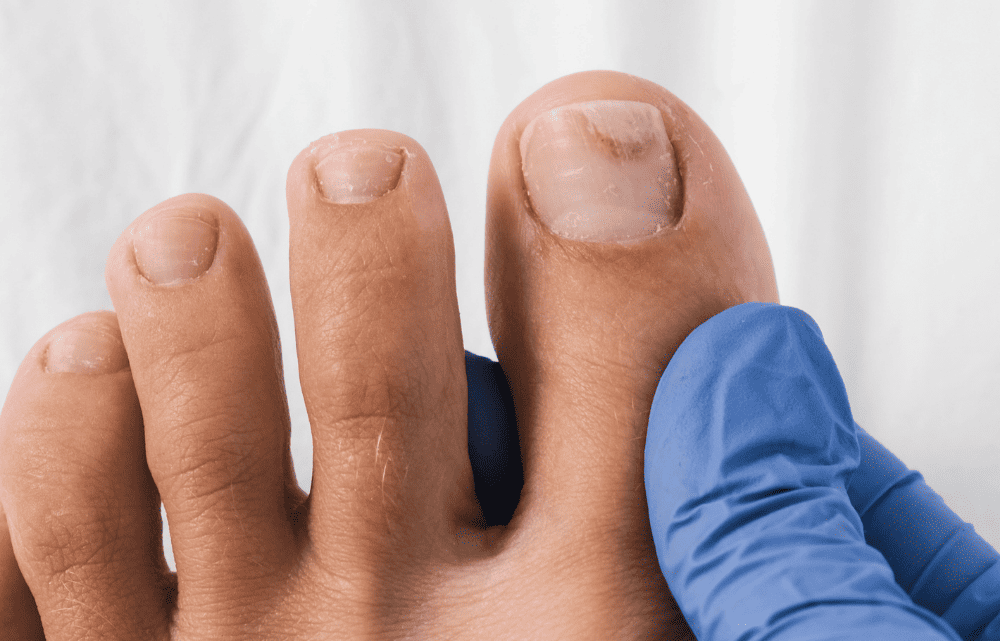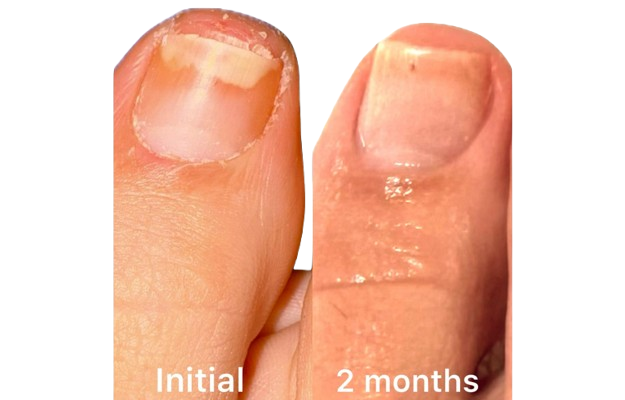Common Types of Fungal Infections We Target
Athlete’s Foot (Tinea Pedis)
A common infection causing itching, burning, and cracked skin on the feet.
Nail Fungus (Onychomycosis)
Yellow, brittle nails caused by fungal growth under the nail bed.
Ringworm (Tinea Corporis)
A contagious skin infection marked by red, ring-shaped rashes.

Who’s Most at Risk?
Certain populations are more vulnerable to fungal infections due to environmental, lifestyle, or medical factors:
- Frequent Nail Salon Visitors: Regular manicures or pedicures increase exposure to communal tools and surfaces.
- Athletes and Gym-Goers: Warm, damp environments like locker rooms and shared showers create ideal conditions for fungal growth.
- Individuals with Diabetes: Compromised circulation and slower healing can make fungal infections more severe.
- Older Adults: Thicker nails and reduced immune responses increase susceptibility.
- People with Weakened Immune Systems: Conditions or medications that suppress the immune system can raise the risk of infection.
How Dr. AntiFungus Can Help
Preventative Care
Our Hand + Foot Soak is formulated to cleanse and protect skin and nails, creating an inhospitable environment for fungal growth.
Targeted Treatment
Our Hand + Foot Spray delivers concentrated antifungal ingredients, stopping infections at their source.
Consistent Protection
Use our products regularly to maintain healthy, fungus-free skin and nails—especially in high-risk environments.

Prevention Tips
- Keep Skin Dry and Clean: Dry well after bathing/swimming.
- Wear Protective Footwear: Use flip-flops in showers or pools.
- Disinfect Regularly: Clean shoes, socks, and tools like nail clippers.
- Choose Safe Nail Salons: Ensure salons follow strict hygiene protocols.
- Trim Nails Carefully: Keep nails short, straight, healthy.
- Change Socks Daily: Fresh, dry socks prevent moisture buildup.
- Avoid Sharing: Don’t share shoes, socks, or nail tools.
- Let Feet Breathe: Choose breathable shoes to reduce moisture.

Why Physicians Trust Dr. AntiFungus:
As physicians, you need reliable, evidence-based solutions to treat and prevent fungal infecntios without systemic side effects. Dr. AntiFungus delivers precisely that—innovative, patent-pending formulas developed by podiatrists and tested in clinical practice.
- Proven Efficacy: Tolnaftate-powered solutions that stop fungal growth and prevent reinfection.
- Safe and Topical: Effective treatment with no blood work or systemic risks.
- Easy Patient Compliance: Soaks and sprays that fit seamlessly into daily routines.
Perfect for Clinical Use and BeyondWhether prescribing for at-home care or integrating into in-office treatments, Dr. AntiFungus is designed to make fungal treatment accessible, effective, and patient-friendly.
Frequently Asked Questions
What are topical antifungal medications?
Topical antifungal medications are drugs applied directly to the skin or nails to treat fungal infections. They work by targeting the fungal cells, either by inhibiting their growth or killing them outright.
How do topical antifungal medications work?
They disrupt the cell walls or membranes of fungal organisms, preventing their growth and replication, ultimately leading to the elimination of the fungal infection.
Which infections do antifungal meds treat?
They can treat a variety of fungal infections, including athlete's foot, ringworm, jock itch, nail fungus, and yeast infections.
How should I apply antifungal meds?
Clean and dry the affected area before applying the medication. Follow the specific instructions provided by your healthcare provider or the medication's packaging.
How should I apply antifungal meds?
Improvement may be noticed within a few days to a couple of weeks of consistent use, depending on the severity of the infection and the specific medication being used.
Can antifungal meds prevent reinfection?
Yes, when combined with hygiene: clean socks, dry feet, and disinfected shoes.
Side effects of antifungal meds?
Some common side effects include irritation, redness, itching, burning, or stinging at the application site. Severe allergic reactions are rare but possible.
Can antifungal meds be used everywhere?
While designed for various parts of the body, some formulations may not be suitable for certain areas. It's essential to follow the product instructions and consult with a healthcare professional if unsure.
Drug interactions with antifungal meds?
While generally safe, there may be potential interactions with other medications. Inform your healthcare provider about all medications, supplements, and herbal remedies you are taking to avoid any adverse interactions.
Use antifungal meds while pregnant?
Consult with your healthcare provider before using topical antifungal medications to ensure safety for both mother and baby.
When to see a doctor for fungus?
If your infection does not show improvement or worsens after several days of consistent treatment, consult with a healthcare professional. Seek medical attention if you experience severe symptoms, such as spreading rash, fever, or signs of a secondary bacterial infection.
Are antifungal meds safe for kids?
Most are safe for children, but dosage and duration should be confirmed by a doctor.
